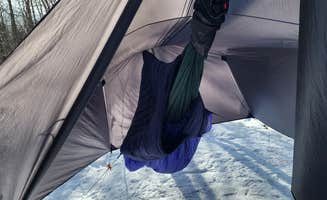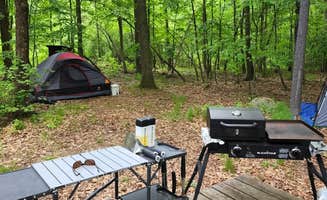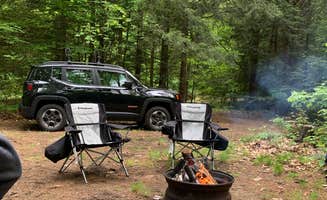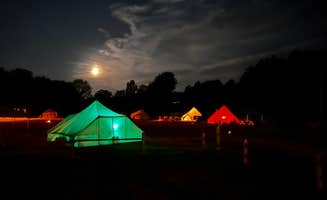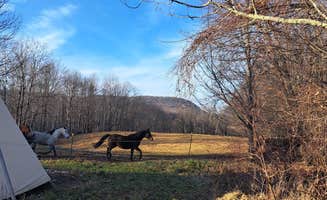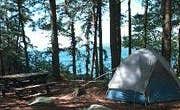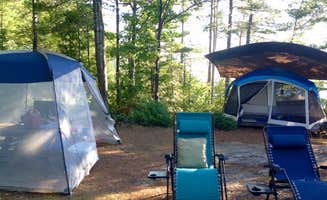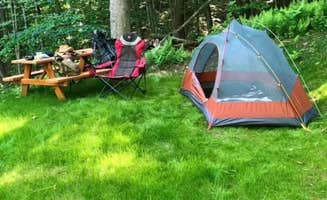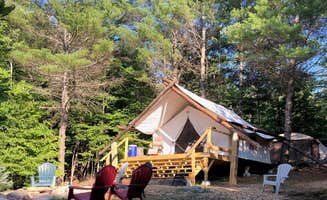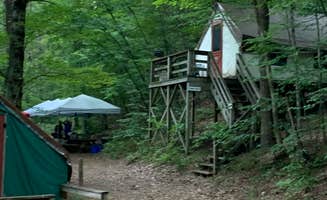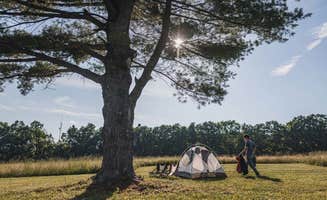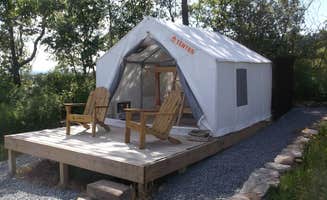Tent campsites near Greenwich, New York range from accessible walk-in forest sites to remote island locations requiring boat transportation. The region sits at the transition between the upper Hudson Valley and southern Adirondack foothills, with elevations ranging from 300 to 1,200 feet. Summer temperatures average 75-85°F while spring and fall camping means cooler nights in the 40-55°F range and variable precipitation.
What to do
Water activities on Lake George: Glen Island Group campgrounds provide direct lake access. "We rented kayaks and actually reserved a spot on our own private island. It was little, slightly wooded, and private," notes one camper at Glen Island Group — Lake George Islands. Water temperature varies seasonally but typically reaches 70°F by July.
Hiking options: The Stratton Pond Shelter area connects several trail systems. "The shelter is at the intersection of AT, LT and Stratton Mountain trail," according to a visitor who adds it features "2 tent platforms, 2 outhouses and at least 16 bunk spaces in the shelter." Winter access requires a 3.75-mile trek through snow.
Bicycle trails: Forest roads provide cycling opportunities on natural surfaces. The trail system at Ushers Road State Forest includes "bicycle-friendly nature trails" with routes extending in multiple directions before transitioning to lower elevation wetland areas, according to trail users.
What campers like
Island solitude: Lake George camping offers unusual privacy. At Long Island Group — Lake George Islands, visitors appreciate the isolation: "Worth a trip from just about anywhere. Absolutely beautiful and you can't beat camping on an island." Sites include boat slips for easy docking.
Shelter access: The Long Trail provides overnight options with basic structures. Seth Warner Shelter "sleeps 6-7 people" and offers "many flat perfect spots" for tents or hammocks if the shelter fills up, according to trail users. Dispersed camping areas surrounding shelters require proper food storage due to wildlife activity.
Family-run facilities: Smaller private campgrounds maintain a personal atmosphere. One visitor to Stony Creek Family Campground reports: "It's a nice family ran campground. We love it here and plan to come back!" Many smaller operations maintain seasonal operation from late May through early October.
What you should know
Boat requirements: Island camping necessitates watercraft. "Definitely need a decent sized boat with a gas outboard to get there," advises a visitor to Glen Island Group — Lake George Islands who adds "no amenities other than an outhouse but spectacular views and pristine waters."
Variable site conditions: Campground maintenance levels differ significantly. Some Lake George island sites receive criticism for poor upkeep: "There were no leveled space whatsoever... These sites have not been maintained in probably 20 years at least. The wooden porta pottys or whatever you call them were grotesque."
Wildlife encounters: Proper food storage prevents animal problems. One camper warns about "the raccoon situation" being "bad" with sites "literally bombarded with a group of raccoons each night." Hanging food from trees remains standard practice at primitive sites throughout the region.
Tips for camping with families
Private islands: Secure separate islands for exclusive family use. One family reports renting kayaks and reserving "a spot on our own private island" which provided front-row seats for July 4th fireworks "over the lake from our private shore."
Fishing opportunities: Lake George offers productive fishing from shore. A family visitor to Stony Creek Family Campground notes their group had "an amazing time on our three night stay" with "great fishing" among their activities.
Seasonal timing: Early summer provides optimal weather with fewer insects. Late June through early July typically delivers temperatures in the 70s with lower humidity before the mid-summer peak season brings increased campground occupancy and higher temperatures.
Tips from RVers
Limited hookup options: Most forest camping areas near Greenwich prohibit RVs entirely. For those willing to travel to Lake George, island sites require special arrangements as described by one RVer: "We spent the rest of our time kayaking, swimming, hiking in the mountains and eating at our favorite local joint."
Boat access challenges: RV camping requires separate boat arrangements for island sites. One visitor to Long Island Group — Lake George Islands describes having "a great spot on Long Island" with "easy boat parking on the slip" which simplified their supply management.
Supply planning: Island camping requires comprehensive packing. A family that stayed three nights recommends bringing "a decent sized boat with a gas outboard" and emphasizes the lack of amenities beyond outhouses, requiring complete self-sufficiency for food, water and other essentials.


